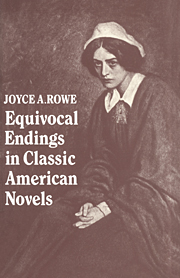 Equivocal Endings in Classic American Novels
Equivocal Endings in Classic American Novels Book contents
- Frontmatter
- Contents
- Acknowledgments
- Introduction
- 1 Nathaniel Hawthorne: “My Kinsman, Major Molineux”: The Several Voices of Independence
- 2 Bleak Dreams: Restriction and Aspiration in The Scarlet Letter
- 3 Mark Twain's Great Evasion: Adventures of Huckleberry Finn
- 4 Strether Unbound: The Selective Vision of Henry James's Ambassador
- 5 Closing the Circle: The Great Gatsby
- Conclusion: Moby-Dick and Our Problem with History
- Notes
- Index
Conclusion: Moby-Dick and Our Problem with History
Published online by Cambridge University Press: 17 August 2009
- Frontmatter
- Contents
- Acknowledgments
- Introduction
- 1 Nathaniel Hawthorne: “My Kinsman, Major Molineux”: The Several Voices of Independence
- 2 Bleak Dreams: Restriction and Aspiration in The Scarlet Letter
- 3 Mark Twain's Great Evasion: Adventures of Huckleberry Finn
- 4 Strether Unbound: The Selective Vision of Henry James's Ambassador
- 5 Closing the Circle: The Great Gatsby
- Conclusion: Moby-Dick and Our Problem with History
- Notes
- Index
Summary
The works we have examined significantly resemble one another. Alike in their resistance to the reality of history, each ultimately sanctions an evasion of the pressure of experience upon the shape of American identity.
“My Kinsman, Major Molineux” was published in 1832, when America was a provincial nation with a largely agrarian economy; when much of it was still wilderness; and when political debate over ‘universal’ suffrage referred to the extension of the vote to property-less white adult males. The Great Gatsby was published in 1925, nearly one hundred years later. In the interval America grew into a world power and ‘universal’ suffrage was revised to include (at least in theory) the entire adult population, regardless of race and gender. That these changes were the issue of a turbulent history – a mixed record of complex social accommodation and profound human injustice – makes all the more paradoxical (and ominous) the evasion of the past, as a personal as well as symbolic motif, by the protagonists of these works. For at bottom, these books all reflect their authors' deep consciousness of that historical drama in which their protagonists inevitably bear a role. As each work comments upon the continuing power of the American dream of a regenerate self to define our experience and determine our moral stance, so each reveals the extent to which this idealism is itself an historical force, encouraging us to conflate the variegated desires of the private self with the redemptive aspirations of the nation.
Indeed, the dichotomous structure of these works suggests just how complex their awareness of historical exigencies may be.
- Type
- Chapter
- Information
- Equivocal Endings in Classic American NovelsThe Scarlet Letter; Adventures of Huckleberry Finn; The Ambassadors; The Great Gatsby, pp. 127 - 137Publisher: Cambridge University PressPrint publication year: 1988


